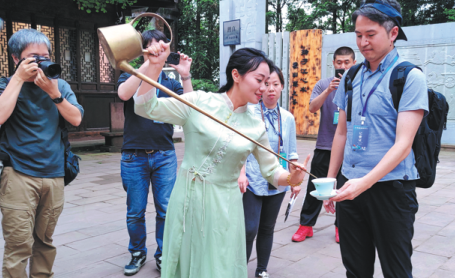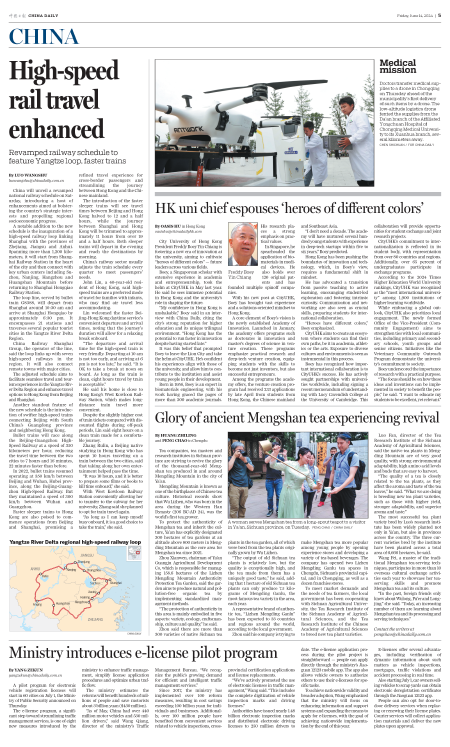
A woman serves Mengshan tea from a long-spout teapot to a visitor in Ya'an, Sichuan province, on Tuesday.
Tea companies, tea masters and research institutes in Sichuan province are striving to revive the glory of the thousand-year-old Mengshan tea produced in and around Mengding Mountain in the city of Ya'an.
Mengding Mountain is known as one of the birthplaces of Chinese tea culture. Historical records show that Wu Lizhen, who was born in the area during the Western Han Dynasty (206 BC-AD 24), was the world's first tea grower.
To protect the authenticity of Mengshan tea and inherit the culture, Ya'an has explicitly designated 300 hectares of tea gardens at an altitude above 800 meters in Mengding Mountain as the core area for Mengshan tea since 2021.
Zhou Xianwen, chairman of Ya'an Guangju Agricultural Development Co, which is responsible for managing 158.6 hectares of the Lizhen Mengding Mountain Authenticity Protection Tea Garden, said the garden aims to produce natural and pollution-free organic tea by implementing standardized management methods.
"The protection of authenticity in this area is mainly embodied in five aspects: variety, ecology, craftsmanship, culture and quality," he said.
Zhou said there are more than 300 varieties of native Sichuan tea plants in the tea garden, all of which were bred from the tea plants originally grown by Wu Lizhen.
"The output of old Sichuan tea plants is relatively low, but the quality is exceptionally high, and the tea made from them has a uniquely good taste," he said, adding that 1 hectare of old Sichuan tea plants can only produce 7.5 kilograms of Mengding Ganlu, the most famous tea variety in the area, each year.
A representative brand of authentic tea, "Lizhen Mengding Ganlu" has been exported to 33 countries and regions around the world, according to the local government.
Zhou said his company is trying to make Mengshan tea more popular among young people by opening experience stores and developing a variety of tea-based beverages. The company has opened two Lizhen Mengding Ganlu tea spaces in Chengdu, Sichuan's provincial capital, and in Chongqing, as well as a dozen franchise stores.
To meet market demands and the needs of tea farmers, the local government has been cooperating with Sichuan Agricultural University, the Tea Research Institute of the Sichuan Academy of Agricultural Sciences, and the Tea Research Institute of the Chinese Academy of Agricultural Sciences to breed new tea plant varieties.
Luo Fan, director of the Tea Research Institute of the Sichuan Academy of Agricultural Sciences, said the native tea plants in Mengding Mountain are of very good quality, with strong environmental adaptability, high amino acid levels and buds that are easy to harvest.
"The quality of a tea is closely related to the tea plants, as they affect the aroma and taste of the tea leaves," he said. "What we are doing is breeding new tea plant varieties, such as those with higher yield, stronger adaptability, and superior aroma and taste."
The most successful tea plant variety bred by Luo's research institute has been widely planted not only in Ya'an, but also in provinces across the country. The three current varieties bred by the institute have been planted across a total area of 6,666 hectares, he said.
Wang Fei, a master of the traditional Mengshan tea-serving techniques, participates in more than 10 overseas cultural exchange activities each year to showcase her tea-serving skills and promote Mengshan tea and its culture.
"In the past, foreign friends only knew about Wulong, Pu'er and Longjing," she said. "Today, an increasing number of them are learning about Mengshan tea and its processing and serving techniques."
Contact the writers at pengchao@chinadaily.com.cn

